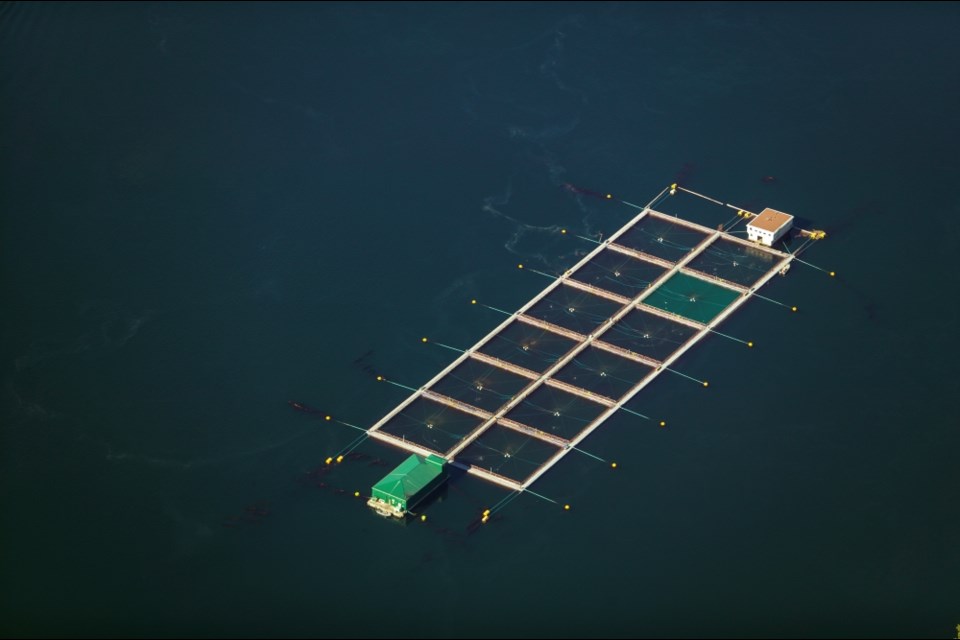By February 2023, fish farms may be a thing of the past in the shíshálh Nation swiya (birthplace, world) in Sunshine Coast waters.
The existing fish (Atlantic salmon) are expected to be removed from active farms by the end of November 2022 and a decommissioning strategy is in the works to leave the sites healthy.
Grieg Seafood BC Ltd. will decommission its fish farm facilities, according to a Nov. 14 press release. The move follows shíshálh Nation’s review of Grieg’s existing facilities through a months-long “consent based decision-making process.” The process included input from Grieg Seafood as well as third-party aquaculture experts about the effects of finfish farms on the environment and potential mitigation measures.
A statement released by Grieg says it held eight seawater licences within shíshálh Nation territory and that six of those farms were previously removed from Grieg’s planning cycle and have been inactive (due to their difficult-to-farm locations). Harvesting in the area has been completed.
“shíshálh ultimately concluded, applying the precautionary principle in a manner consistent with shíshálh laws and responsibilities and in order to protect shíshálh resources, including wild salmon, the farms must be removed,” the Nation's release states.
The shíshálh Nation is also known as the salmon people, who “have deep concerns about the impacts of finfish aquaculture on wild salmon” and have raised their concerns with federal and provincial governments for more than three decades, the Nation's release states. “These concerns have only increased over the years as we have witnessed the substantial decline in the swiya salmon populations, which has had dramatic impacts on shíshálh way of life.”
hiwus Warren Paull said the decision-making process is one aspect of implementing the United Nations Declaration on the Rights of Indigenous Peoples.
In the 1980s, the shíshálh swiya was the main hub for finfish aquaculture, hiwus Paull said in the release. But as fewer farms exist, the Nation’s concerns remain.
“Protecting this precious resource for future generations has always been our priority,” hiwus Paull said. “Removal of the farms is one step in protecting the wild salmon.”
In June 2022, Minister of Fisheries and Oceans Joyce Murray announced the federal government would be moving to phase out open-net pen salmon farms in B.C. by 2025. How that will be done is expected to be announced in the spring of 2023, but the transition could still include ocean-based farming, the minister told Glacier Media in June. The 79 open-net pen salmon farms outside of the Discovery Islands were granted licence renewals by DFO to give involved parties (Indigenous communities, industry, government levels and environmental groups) time to come up with a plan.
In Sunshine Coast waters, there are nine active finfish aquaculture licences set to expire on June 30, 2024, according to Fisheries and Oceans Canada. One licence is held by MOWI Canada West at Glacial Creek (Jervais Inlet), while the rest are held by Grieg.
Grieg is headquartered in Campbell River, has 22 farms in B.C. and has approximately 180 full-time employees, the company’s website says. In a statement on the company’s website, Grieg says it “fully supports the First Nations in whose territories it operates, including recognizing and honoring the rights of First Nations to self-determine what aquaculture development they choose for their Nation.”
The change “will not result in employee layoffs and Grieg Seafood BC Ltd.’s total harvesting volume targets will not be impacted,” the company says.
Grieg’s statement says the company shares concerns for the declining wild salmon population and “is committed to farm with the lowest possible impact and to continuously improve its operations” as it develops new farming technologies. The company also says it is in the ongoing process of phasing out older and smaller sites while developing sites that are well-suited to salmon farming.
The removal of the fish farms will affect another Sunshine Coast-based company: Salish Soils. CEO Aaron Joe told Coast Reporter Salish Soils receives fish waste from those farms, which is then used to create a high-nitrogen compost. While Salish Soils will have fish compost for 2023, because they’ve been making it all year, they’ll likely run out by mid-2024.
“We’re sorry to hear of this news. We’ve had a great relationship with Grieg Seafood for the past 12 years,” Joe said. “I think it’s a great step for the Nation to take control of their swiya. As I’ve always said before, we seem to inherit the status quo of business as usual. I like to see us as a Nation innovating new processes that align with our values as First Nations people."
It will also be a positive change for the residents of East Porpoise Bay, he added, as there will soon be no more fish smell coming from Salish Soils. While he doesn’t anticipate finding another source for fish waste, Joe said it will allow Salish Soils to focus more on its community’s organics.
with files from Stefan Labbé / Glacier Media



